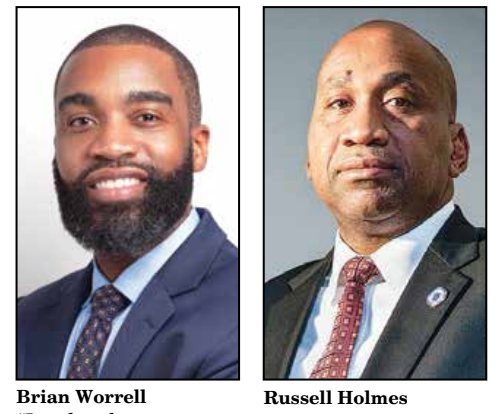November 17, 2022

While violence has occurred in other parts of the city, no other area has been affected as much by lawlessness as the Blue Hill Avenue corridor from Mattapan Square through Dorchester to Dudley Street. Residents and business owners have struggled to get their on-the-ground voices heard in the noise of discussions, and the only two elected officials who live along the corridor say their concerns aren’t always heard or believed.
Now, those officials, City Councillor Brian Worrell and state Rep. Russell Holmes, are asking for more resources, and, from outsiders, a better understanding of what the community is facing.
Worrell, who represents Dorchester and Mattapan on the council, grew up off Blue Hill Avenue and still lives there. Citing a lifetime of trauma, he noted that there have been 223 shots-fired reports in Dorchester alone this year. As city leaders point to an overall crime decline in Boston, he said, those living in the community just don’t feel it.
“We’re dealing with completely different issues than any other part of the city,” he said. “I can’t expect other people to really understand 223 shots going off in your neighborhood. Keep in mind, 223 shots is down compared to other years. If you’ve been around 10 or more years, it all just builds up. Years and years of having more than 200 shots fired in your neighborhood is going to affect people.”
Worrell plans to release a District 4 Safety Plan calling for targeting resources. “If 30 houses are burning down on a street, that’s the street we would focus on to figure out what’s going on with all these fires,” he said. “That’s the approach I would like to see in District 4.”
Holmes agreed with that approach and said he plans need to focus on needs “up and down Blue Hill Avenue, Mattapan to Dudley. That’s where it is,” he said. “It’s not a very big area you have to watch…It’s unacceptable that these neighbors have to be terrorized by a few people.”
A resident of Mattapan off Blue Hill Avenue who grew up in Mattapan Square, Holmes said there are a lot of misconceptions of the moment they’re living through as he panned the idea of a self-imposed curfew that has been floated by some activists.
“I’m a taxpayer and a homeowner and I shouldn’t have to run away and give the streets away – that doesn’t sound like a good idea to me,” said Holmes, who also pushed back on the “defund the police” slogan that has gained currency in some circles.
“I still continue to hear a strong amount of support for police and the mayor and a strong amount of confidence in our new commissioner,” he said, referring to Michael Cox, who became Boston’s top cop in August. “The whole ‘defund the police’ you’ll never hear that in a community meeting here…I’ve not heard the defund perspective from constituents and it’s not in alignment with what I’m hearing. As a matter of fact, it has angered people enough that they will call me to say they don’t support that.”
What people do support is a return to “community policing,” Holmes and Worrell said. “The police are angry,” Holmes said. “They are doing the opposite of what we would like them to do. They’re only responding to radio calls…We are calling for community policing and not the community to be policed. Those are two different things.”
Said Worrell: “The police definitely need to be walking our neighborhoods and getting familiar with our residents as much as possible. It’s different when police are constantly talking to our neighbors as opposed to talking to them when a crime happens.”
Both politicians said that people aren’t comfortable reporting crimes to the police in the most affected areas. Holmes, noting that several police commissioners, including Cox, have criticized the community for not picking up the phone, said that posture ignores the real fear of retaliation.
“The police know that the people don’t trust that if they make a report, it will remain anonymous because historically they have seen people show up at the door, police officers, when it was supposed to be anonymous,” he said. “It only takes one or two police going there and folks won’t trust it from then on…Without that, people won’t continue to report things. I understand that. These crimes are scary.”
Instead of criticizing the community for not calling, police need to encourage them and “it’s not encouraging when you say, ‘Well, y’all don’t pick up the phone,’” Holmes said. “They are scared to pick up the phone.”
Worrell said he has heard the same thing and hinted that his safety plan will call for a hotline that is community-led and separate from the Police Department that residents can call to report crime, to talk to someone, or to identify someone who might need mental health resources.
The recent violence has hit Worrell the closest of any elected official, as his own barber and close friend, Max Hylton, was murdered while cutting hair at Celebrity Cuts on Washington Street last month. The killing prompted a tearful speech by Worrell on the floor of the Council. He said the tears were the culmination of years of frustration.
“What it felt like was here we are talking about things that should have been solved when I was a teen-ager,” he said. “My emotions came from the lack of response when it comes to investing in Black and brown lives, especially young Black men…Because I went to school in Lincoln-Sudbury and I remember thinking there was a curse on us and our family...No one else at school had these problems. I thought there was something wrong with me.”


